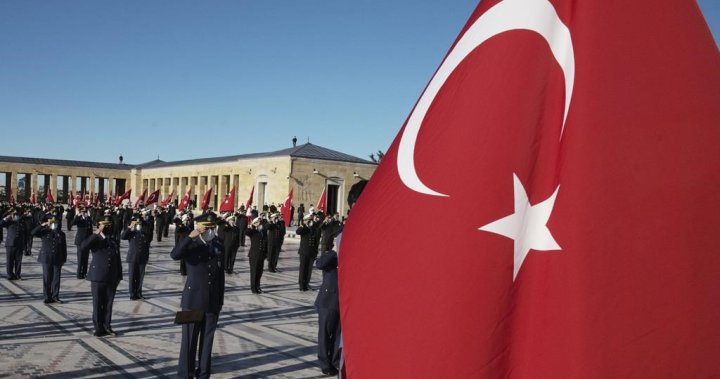Turkey’s deputy minister of foreign affairs says Ankara still wants Canada to drop its arms embargo, while pushing back on concerns about tensions between Azerbaijan and Armenia.
“One issue … about (which) unfortunately Turkish diplomats are not happy, is the restriction of defence equipment, although we are in the same alliance of defence for collective security,” said Ahmet Yildiz, one of the top diplomats in Turkey’s foreign service.
During a Tuesday forum organized by the Institute for Peace and Diplomacy think tank, Yildiz said Canada shouldn’t have such restrictions on a military ally.
“We are disappointed that these restrictions continue. We have a lot of responsibilities in the Black Sea, in the Mediterranean to defend NATO interests, but we are sanctioned.”
Canada halted new export permits to Turkey in October 2019 after a military incursion into Syria, and temporarily downgraded those restrictions in April 2020 for six months.

In October 2020, Canada again suspended export permits given “credible evidence that certain Canadian military goods and technology exported to Turkey” had been used in conflicts such as that in the Nagorno-Karabakh region.
The region has been controlled by Armenia in the past and is populated by ethnic Armenians, but it is internationally recognized as part of Azerbaijan.
Ottawa believes Azerbaijan has been using Turkish drones equipped with Canadian sensors, in line with extensive media reporting. It also has evidence that Turkish drones with Canadian sensors might have been used in Libya and Syria.
At the NATO summit in July, media reports quoting unnamed Turkish officials claimed Canada reopened talks on the arms embargo.
The Canadian Press has not independently verified the reports, but Canada’s former military envoy to Turkey has said Ottawa might lift its arms embargo if Ankara supports Sweden’s bid to join NATO, and if it agrees to restrictions on where Canadian drones can be used.

Meanwhile, Yildiz also said Tuesday that Turkish officials have been asking Canadian officials about increasing flights.
“Turkish Airlines wants to make more flights to Vancouver, to Toronto, to Montreal. Why not to Ottawa? It is really needed for interaction (between) people for more exposures to each other.”
Canada’s existing arms embargo stems from a war between Armenia and Azerbaijan in 2020 over the Nagorno-Karabakh region, where tensions have drastically escalated in recent weeks.
Tensions rose in the area a year ago when the region’s main access road was blocked, leading to months of shortages of food and medicine that groups such as Human Rights Watch blame on Azerbaijan.
Last week, Azerbaijan unleashed heavy artillery fire on separatist militias and reportedly killed scores of people, raising fears of all-out war. But a ceasefire was declared within 24 hours and Azerbaijan says it wants to integrate Armenians into its country as “equal citizens.”
But Canada’s ambassador to the United Nations, Bob Rae, warned this week that Azerbaijan might be undertaking “ethnic cleansing” in the region, and the NDP and Bloc Quebecois have called on the Liberals to sanction Azerbaijan officials.

Foreign Affairs Minister Melanie Joly told Parliament she’s open to the idea.
“Concerning sanctions, we always try to act in co-operation with a number of other countries,” she said Tuesday.
“Putting pressure on the country concerned is important. Everything is on the table, and sanctions are always a tool that can be highly effective.”
This week, Turkey and Azerbaijan have raised the prospect of pursuing linking Azerbaijan’s mainland with an exclave through a corridor that runs through Armenia.
Iran had opposed the idea, on the grounds it would lead to Azerbaijan trying to claim parts of southern Armenia and remove the only border between Iran and Armenia.

Yildiz poured water on concerns Tuesday.
“Iran has no reason to be concerned about this; if they are, it is a kind of paranoia,” he said.
Yildiz noted that a 2020 ceasefire negotiated by Russia includes having Armenia “guarantee the security of transport connections” between Azerbaijan’s mainland and its exclave, including the “unobstructed movement of persons, vehicles and cargo in both directions.”
He noted that everything Azerbaijan has done in Nagorno-Karabakh this month occurred within its sovereign borders, and the principle of territorial integrity would require the country to not invade Armenia.
“It will restore high confidence between the two sides in the region,” he said of the idea of a corridor between both parts of Azerbaijan.
© 2023 The Canadian Press




